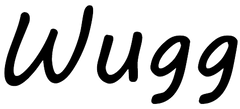
Ethics
Eco friendly – Ethically sourced
Ethical Fur Ugg Boots
Wuggs are made from leather which is a by-product of wallaby meat production by Lenah Game Meats. ‘Lenah’ is an Aboriginal word for wallaby and we harvest Tasmanian wallaby under strict government control to supply meat for human consumption to supermarkets and restaurants across the country. Wallaby are super abundant in Tasmania, there are over 3 million of them. Their numbers have exploded as a result of increased pasture production by farms. There are so many that they are a major economic problem for farms and need to be controlled. As a result, the government issues crop protection permits to farmers to enable them to mitigate the economic impact of wallaby. Lenah turns this damage mitigation cull into a commercial harvest to enable these animals to be utilised rather than wasted.
When we started Lenah Game Meats in the early 1990’s, climate change was a faint whisper on the wind. Today it’s around us with a force that often feels as mighty as the roaring forties that blew across Tasmania’s ancient wilderness. Making the world an economically, socially and environmentally safe place for our children is our number one priority.

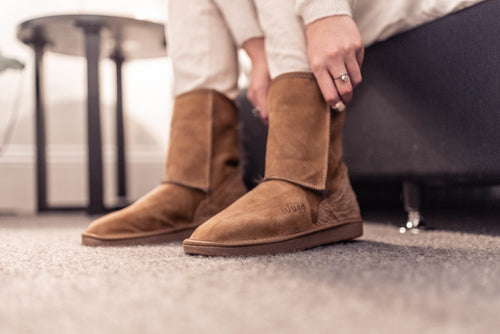
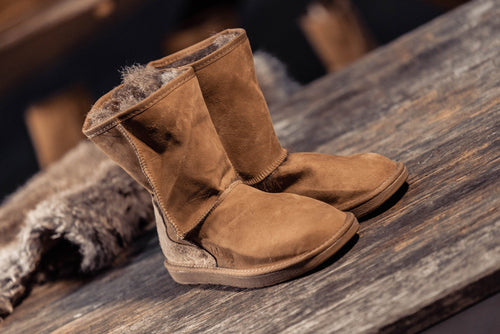
TEXT LINE #1
Text line #2

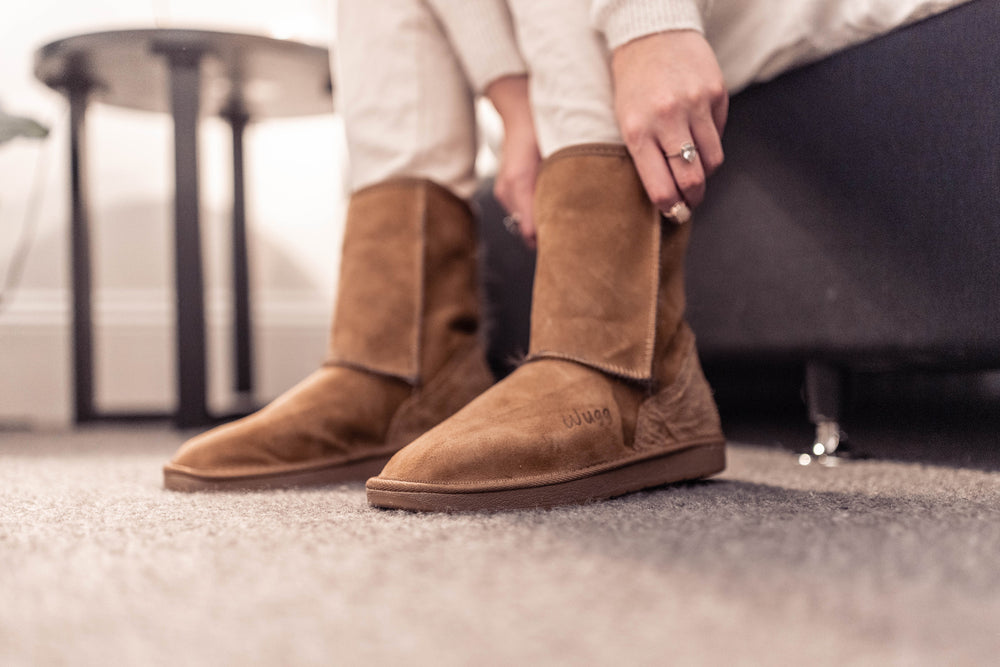
TEXT LINE #1
Text line #2
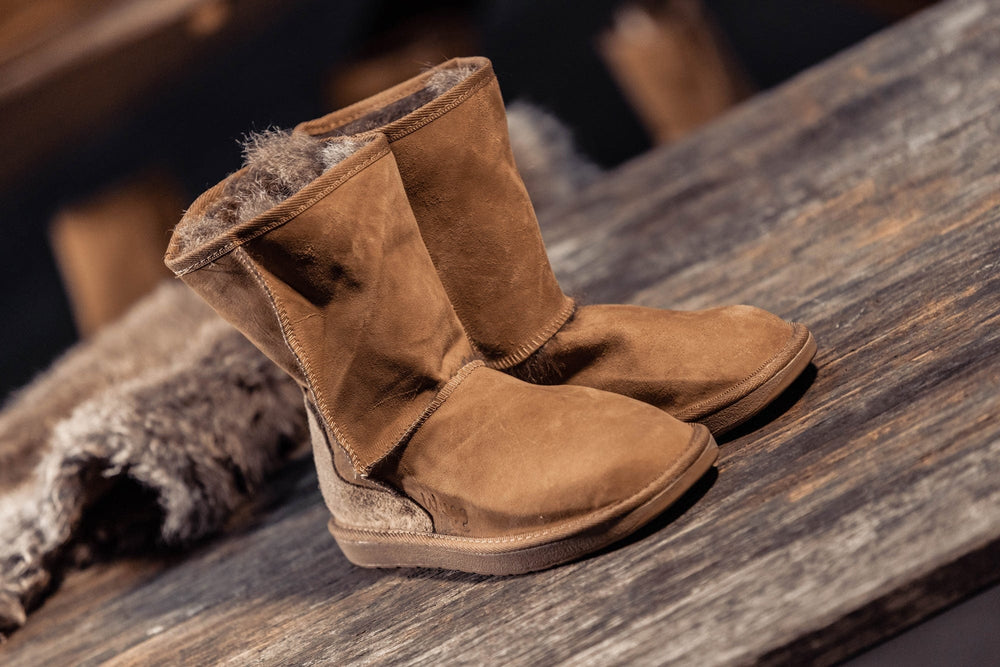
Sustainability
All of our Tasmanian wallaby are wild sourced from their natural environment under strict Government control and regulation. The Tasmanian government has been monitoring the wallaby population every year for the last 50 years. They have highly refined monitoring systems to ensure the populations remain extremely healthy. There are well over 3 million wallabies in Tasmania and their numbers are consistently increasing.
Every year, the government surveyed 190 transects across the State to count the numbers of animals seen. Each transect is 10 km long. The data is compiled into regional and overall State density estimates. These are not designed to give an exact population figure, but they do deliver a sophisticated estimate of population density and health.
Lenah only process Tasmanian bennetts wallaby. Their densities vary with seasonal conditions, but bennett wallaby densities across the State and in each region have been steadily increasing throughout this century - as shown in the graph below extracted from the government's annual report on density monitoring. The full report detailing techniques and the latest results is available if you want it, just ask us.
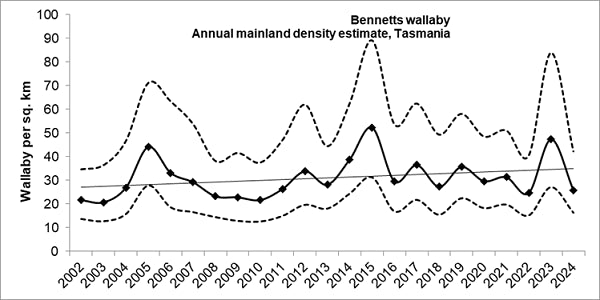
The top and bottom lines represent 95% confidence limits. Straight line is the long-term trend. The Densities shown in the middle line is measured in individuals per square kilometre.
If the Tasmanian wallaby population densities show any sign of long term decline, the government will re-asses the wallaby harvest. But at present, they are super-abundant (there are over 3 million Bennett’s wallaby in Tasmania) and the population is increasing. And given wallaby have been harvested commercially throughout the 50 years of population monitoring, the commercial harvest is considered highly sustainable.
Lenah was established to create markets for wallaby meat and fibre on the belief it makes sense to produce food from the animals perfectly adapted to our environment. Wuggs are our latest effort to maximise the value of these beautiful products. One day we hope to see wallaby produced as a real farm enterprise, as an alternative to farming sheep and cattle.
Reducing emissions
Methane is produced in large quantities in the stomachs of farm animals such as sheep and cattle. It’s 23 times worse than carbon dioxide as a global warming gas. Methane gas emissions from livestock account for over 10% of Australia’s annual greenhouse gas emissions.
Tasmanian wallabies have a digestive system that produces almost no methane. Meaning our wallaby ugg boots are virtually carbon neutral and can be purchased with a carbon-free conscience. The CSIRO has for many years been attempting to find out why wallaby emit so little methane and transfer the capacity to cattle. We’d prefer to utilise the wallaby instead.
Zero Waste
We use all parts of the Tasmanian wallaby we harvest so there is minimal waste. We produce a range of portion-controlled cuts and smallgoods for restaurants and the home cook as well as preservative free high quality pet food products from the bones. And we turn the wallaby skins into Wuggs. By doing so, we fully close the loop and use the entire animal.
Animal Welfare
We harvest wallaby under the strict controls of the Australian Code for the Humane Shooting of Kangaroo and Wallaby for Commercial Purposes. Adherence to this is a condition of all Tasmanian wallaby harvesting. The RSPCA is on record as saying that an animal harvested directly from its natural environment under the conditions of the Code, is under less stress than are farm animals transported to abattoirs. Extensive field research has shown that harvesting animals in compliance with the Code leads to instant and painless death.
Tasmanian government Inspectors regularly audit wallaby harvesters under their actual operating conditions in the field to check their compliance with the Code. Years of data collected during these audits demonstrate that our harvesters consistently comply with the Code. This data demonstrates that over 99% of animals targeted by our harvesters are killed instantly. That’s as close to perfect as it is possible to get.

